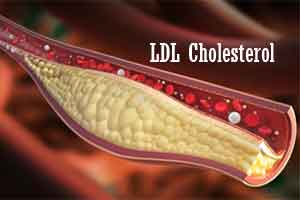- Home
- Editorial
- News
- Practice Guidelines
- Anesthesiology Guidelines
- Cancer Guidelines
- Cardiac Sciences Guidelines
- Critical Care Guidelines
- Dentistry Guidelines
- Dermatology Guidelines
- Diabetes and Endo Guidelines
- Diagnostics Guidelines
- ENT Guidelines
- Featured Practice Guidelines
- Gastroenterology Guidelines
- Geriatrics Guidelines
- Medicine Guidelines
- Nephrology Guidelines
- Neurosciences Guidelines
- Obs and Gynae Guidelines
- Ophthalmology Guidelines
- Orthopaedics Guidelines
- Paediatrics Guidelines
- Psychiatry Guidelines
- Pulmonology Guidelines
- Radiology Guidelines
- Surgery Guidelines
- Urology Guidelines
Half of people aged 40-54 have hardened arteries: study

Half of the middle-aged people who are normal weight and don't smoke or have diabetes may have clogged arteries, researchers said Thursday, urging stronger measures to lower cholesterol.
A high level of so-called "bad cholesterol," or LDL-C, is the main reason why apparently healthy individuals suffer heart attacks or strokes in middle age, said the report in the Journal of the American College of Cardiology (JACC).
"Atherosclerotic plaques are present in 50 percent of middle-aged individuals (40-54 years old) with no classical cardiovascular risk factors," said the study.
The report was based on nearly 1,800 people who had no classical risk factors for heart disease or stroke.
LDL cholesterol was the top predictor of arteries that were in the process of hardening but had not yet caused a health crisis.
Current guidelines from the US National Cholesterol Education Program describe LDL-C levels that are above 160 mg/dL as "high." Those from 130 mg/dL to 159 mg/dL are considered "borderline high." Experts should consider lowering these thresholds to improve population health, the researchers argue.
"Although the absence of classical cardiovascular risk factors is linked to a low risk of cardiovascular events, people in this situation still have heart attacks and strokes," said lead author Leticia Fernandez-Friera.
"We therefore need to define new markers of early atherosclerosis in these apparently healthy individuals."

Disclaimer: This site is primarily intended for healthcare professionals. Any content/information on this website does not replace the advice of medical and/or health professionals and should not be construed as medical/diagnostic advice/endorsement or prescription. Use of this site is subject to our terms of use, privacy policy, advertisement policy. © 2020 Minerva Medical Treatment Pvt Ltd